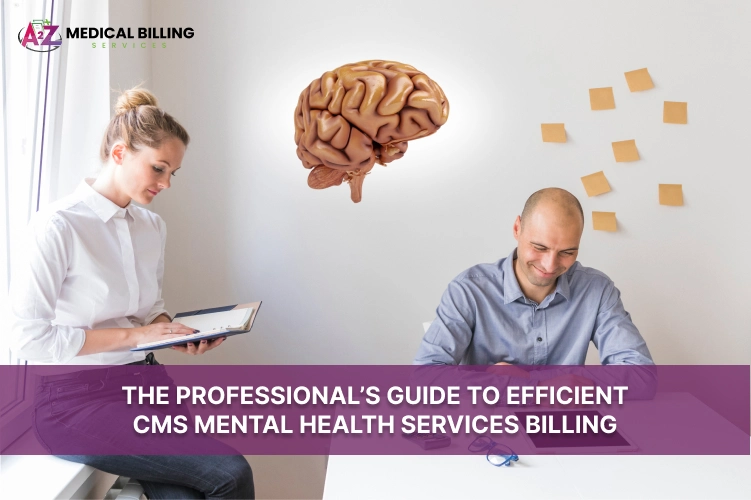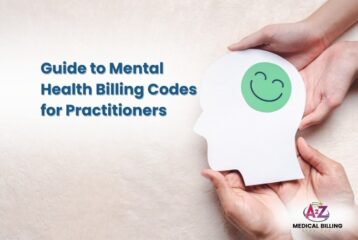Understanding the Centers for Medicare and Medicaid Services (CMS) requirements for mental health billing is essential for healthcare billing specialists. These criteria not only ensure compliance but also streamline the payment process, avoiding errors and delays that can have an impact on medical practices’ financial health.
Understanding CMS Guidelines for Mental Health Billing
Important CMS Guidelines and Updates
CMS standards are always changing, and regular modifications can have a substantial impact on how mental health treatments are invoiced. Billing professionals must keep up with these changes to avoid claim denials and reimbursement problems. Here’s a summary of essential guidelines:
Diagnostic Evaluation Codes: Mental health billing relies heavily on codes such as 90791 for psychiatric diagnostic evaluations without medical services and 90792 for medical services.
Psychotherapy sessions: Are billed based on their time; popular codes are 90832 (30 minutes), 90834 (45 minutes), and 90837 (60 minutes).
Crisis Psychotherapy: For acute mental health crises, utilize 90839 for the first 60 minutes and 90840 for each subsequent 30 minutes.
Group Psychotherapy: Code 90853 is used for group therapy sessions in circumstances that encourage group interaction.
Recent updates to CMS Mental Health Billing:
- Expansion of Telehealth Services: Telehealth service coverage has been expanded in recent updates, allowing more individuals to get mental health care remotely.
- Billing Code Modification: Because billing codes change on a regular basis, practitioners must stay up to date to use the correct code for services delivered.
Impact of Not Following CMS Updates
| Consequence | Description |
| Claim Denials | Using outdated codes or non-compliant procedures often leads to denied claims. |
| Revenue Loss | Inaccuracies in billing directly affect the bottom line by delaying or reducing reimbursement. |
| Compliance Risks | Non-adherence to updated guidelines can result in audits, penalties, or legal issues. |
Eligibility and Coverage Essentials
Understanding the scope of coverage and eligibility criteria for CMS mental health services is crucial for effective invoicing. This section describes the covered services as well as the eligibility conditions for patients, ensuring that claims are compliant and authorized on time.
CMS-covered services for mental health
CMS provides a wide range of mental health treatments, including but not limited to outpatient therapy sessions, psychiatric examinations, and certain forms of inpatient care. Individual and group psychotherapy, mental diagnostic interviews, and pharmacologic management are among the most commonly covered therapies.
Key Covered Services Include:
- Individual psychotherapy (90832, 90834, 90837)
- Group psychotherapy (90853)
- Psychiatric diagnostic evaluation (90791, 90792)
Patient Eligibility Criteria for Billing
To be eligible for CMS-covered mental health services, a patient must meet a number of requirements. These include a written diagnosis from a certified mental health professional and a treatment plan outlining the need for the services given. Additionally, the services must be deemed medically required for the treatment of the patient’s illness.
Essential Eligibility Criteria:
- Formal diagnosis: Confirmed by a licensed healthcare professional.
- Treatment Plan: Outline the services and their requirement.
- Medical Necessity: Services must be critical to the patient’s treatment.
Overview of CMS Mental Health Services Coverage and Eligibility
| Service Type | Coverage Details | Eligibility Criteria |
| Individual Psychotherapy | Typically covered for 30, 45, and 60 minutes | Must be deemed medically necessary |
| Group Psychotherapy | Covered under most plans | Requires a formal treatment plan |
| Psychiatric Evaluations | Initial and sometimes follow-up evaluations | Formal diagnosis and referral from a physician |
Preventing Common Billing Errors
Errors in CMS mental health care billing can result in claim rejections and reimbursement delays, severely hurting practices’ financial health. Understanding and avoiding these frequent errors is crucial for ensuring a successful billing process.
Common Failures of Mental Health Billing
Several common errors arise in the billing process for mental health care.
- Incorrect Coding: Using out-of-date or incorrect codes is a leading cause of billing mistakes.
- Incomplete documentation: Failure to submit complete treatment information can result in refused claims.
- Patient Eligibility Errors: billing for treatments that are not covered by the patient’s specific insurance plan.
Strategies to Ensure Claims are Compliant and Error Free
Consider the following ways to reduce errors and improve billing process’s accuracy:
- Regular Training: Keep personnel up-to-date on the newest CMS guidelines and coding updates.
- Use Automated Tools: Install billing software that automatically updates codes and checks for problems.
- Thorough Documentation: Make sure all records are detailed and completely support the services being billed.
Common CMS Mental Health Services Billing Codes:
- Psychiatric Diagnostic Evaluation-90791
This code is used for a new patient’s initial assessment that does not include medical services. It consists of a complete history, a mental status examination, and management recommendations.
- Psychiatric Diagnostic Evaluation with Medical Services-90792
Similar to 90791, but with medical services such as a physical examination, which may be required for medication management or to differentiate between psychiatric and medical concerns.
- Psychotherapy (30 minutes)-90832
Used for 30 minute one-on-one psychotherapy sessions. This code is necessary for sessions that do not meet the longer session requirements.
- Psychotherapy (45 minutes)-90834
This code is used for psychotherapy sessions lasting about 45 minutes. It is one of the most common bills.
- Psychotherapy for 60 minutes-90837
Suitable for psychotherapy sessions that last approximately 60 minutes. Ideal for accurate therapeutic procedures.
- Psychotherapy for Crisis; first 60 minutes-90839
This emergency code is used when a patient is in an emergent condition and requires rapid and extensive therapeutic care. The first 60 minutes are billed using this code.
- Psychotherapy for Crisis; every extra 30 minutes-90840
Used in combination with 90839 to provide an additional 30 minutes of crisis psychotherapy.
- Group Psychotherapy-90853
This code is used for group psychotherapy. It does not specify a time frame, however sessions normally last between 30 and 60 minutes.
- Brief Emotional/Behavioral Assessment-96127
Brief assessments for monitoring or follow-up reasons. It may include standardized tools to assess depression symptoms, anxiety, and so forth.
- Structured screening for alcohol and/or substance misuse-99408
This category is used to describe organized screening and brief intervention programs for substance use.
Guide to Using CMS Mental Health Billing Codes
| Code | Service Type | Usage Tips |
| 90791 | Diagnostic Evaluation | Use for initial assessments without physical interventions |
| 90792 | Diagnostic Evaluation with Meds | Include when a physical exam is part of the assessment |
| 90832 | Psychotherapy, 30 min | Ideal for brief sessions or follow-up therapy |
| 90834 | Psychotherapy, 45 min | Standard for most therapy needs |
| 90837 | Psychotherapy, 60 min | Best for comprehensive therapy sessions |
| 90853 | Group Psychotherapy | Use for sessions involving multiple patients |
| 90839 | Crisis Psychotherapy, 60 min | initial code for crisis intervention |
| 90840 | Additional Crisis Psychotherapy | Use after 90839 for extended crisis sessions |
Final Thoughts
Accurate billing is more than just a financial or administrative activity; it is an essential component of healthcare that ensures treatments are available and providers are fairly compensated. Improving billing methods contributes to the larger goal of providing consistent, high-quality mental health care.
Don’t miss out on the discussion below by sharing your experiences or questions about CMS mental health billing. Contact us to book a consultation and improve your billing methods. We can reach billing excellence together!
FAQs
1. What is the CMS billing procedure for mental health services?
CMS mental health services billing entails submitting claims for mental health treatments supplied to patients while adhering to the rules established by the Centers for Medicare and Medicaid Services (CMS).
2. Why is it critical to stay current with CMS guidelines?
Keeping up with CMS rules is critical for compliance, reducing claim denials, and ensuring that billing procedures are in line with current regulatory requirements.
3. How might technology enhance CMS mental health billing?
Advanced billing software, for example, improves billing accuracy and efficiency by automating updates, checking codes, and speeding claim submissions.
4. What are some frequent billing codes for CMS mental health services?
Common billing codes are 90791 for mental diagnostic examinations without medical services and 90834 for a typical 45-minute psychotherapy session.
5. How can I learn more about effective CMS mental health service billing?
Participating in ongoing education through webinars, courses, and certification programs can provide deeper insights and keep you up to date on the best practices in CMS mental health billing.



